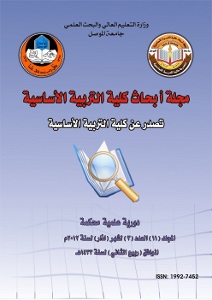The effect of Davis model on academic achievement among second-grade middle school students in social studies
Abstract
The research aims to identify the impact of the the academic achievement of second-grade students in the middle school in Sociology subject . The research sample (65) students were intentionally selected from the research community divided into two groups, the experimental group included (33) students who studied according to the Davis model, and the control group included (32) students who studied according to the usual method, and the researcher rewarded between these two groups in a number of variables: (Chronological age, grades of history in the first course of the academic year (2018-2019), and the educational level of the parents). Achieving the goal of the research required the presence of a tool to measure academic achievement, and the researcher prepared a scale consisting of (50) items, and for each item there are three alternatives: (often - sometimes - rarely). Relying on previous studies. The validity of the tool was calculated using the apparent validity and the content validity, while the reliability was calculated using the (Alpha Crohn-Bach) equation. The stability coefficient was (0.82). After collecting, correcting and analyzing the data using the T-test for two future samples, the results showed a statistically significant difference between the average scores of students in the experimental group and the control group in academic achievement and in favor of the experimental group, and in light of the research results, the researcher came up with a set of recommendations and suggestions.
